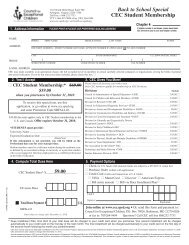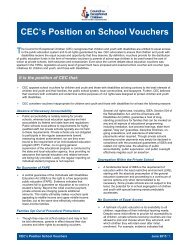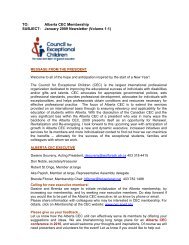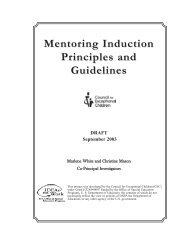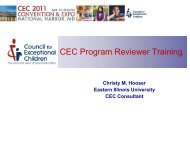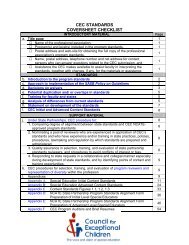What Every Must Know Special Educator - Council for Exceptional ...
What Every Must Know Special Educator - Council for Exceptional ...
What Every Must Know Special Educator - Council for Exceptional ...
Create successful ePaper yourself
Turn your PDF publications into a flip-book with our unique Google optimized e-Paper software.
especially those already burdened by poverty and<br />
prejudice.<br />
b. Most group intelligence tests are multileveled and<br />
standardized on grade samples, thus necessitating<br />
the use of interpolated and extrapolated norms<br />
and scores.<br />
c. Most group intelligence tests, standardized on<br />
LEAs rather than individual students, are not<br />
standardized on representative populations.<br />
d. In spite of the use of nonrepresentative group<br />
standardization procedures, the norms are<br />
expressed in individual scores.<br />
e. Most group intelligence tests, standardized on<br />
districts which volunteer, may have a bias in the<br />
standardization.<br />
f. Many of the more severely handicapped and those<br />
expelled or suspended have no opportunity to<br />
influence the norms.<br />
g. Group intelligence tests are heavily weighted with<br />
language and will often yield spurious estimates<br />
of the intelligence of non-English speaking or<br />
language different children.<br />
h. A group intelligence test score, although spurious,<br />
may still be a good predictor of school per<strong>for</strong>mance<br />
<strong>for</strong> some children.<br />
i. School achievement predicts future school<br />
per<strong>for</strong>mance as well as group intelligence tests,<br />
thus leaving little justification <strong>for</strong> relying on group<br />
intelligence tests.<br />
j. One of the most frequent abuses of group<br />
intelligence tests is the use of such tests with<br />
populations <strong>for</strong> which they are inappropriate.<br />
The <strong>Council</strong> goes on record in full support of the recommendations<br />
of the “Classification Project” (Hobbs,<br />
The Futures of Children, 1975, pp. 237-239) pertaining<br />
to group intelligence testing as follows:<br />
a. “... That there be established a National Bureau of<br />
standards <strong>for</strong> Psychological Tests and Testing.”<br />
b. That there be established “minimum guidelines<br />
with respect to the utilization of psychological<br />
tests <strong>for</strong> the classification of children.”<br />
258 whAt every SpeCiAl eduCAtor muSt <strong>Know</strong><br />
c. “That organizations that make extensive use<br />
of educational and psychological tests...should<br />
establish review boards to monitor their testing<br />
programs.”<br />
Until these three recommendations are accomplished,<br />
The <strong>Council</strong> encourages a moratorium on the use<br />
of group intelligence tests by individual school<br />
districts <strong>for</strong> the purpose of identifying children with<br />
exceptionalities.<br />
Paragraph 14 - Exit Exams <strong>for</strong><br />
Students with <strong>Exceptional</strong>ities<br />
To ensure that exit exams are appropriately carried out<br />
regarding students with exceptionalities, it is the position<br />
of the <strong>Council</strong> <strong>for</strong> <strong>Exceptional</strong> Children that:<br />
a. No single test score should be used to make<br />
critical educational decisions <strong>for</strong> students with<br />
exceptionalities. Multiple measures that document<br />
student learning and skills development should<br />
be used with accommodations when appropriate,<br />
in the decision-making process.<br />
b. All students with exceptionalities must be given<br />
the opportunity to learn the material that is covered<br />
on exit exams. This includes the provision of<br />
individualized instructional services and supports<br />
that address the general education curriculum<br />
that is aligned with standards, test content, and<br />
the student’s IEP. An alternate assessment should<br />
be an option <strong>for</strong> a student as recommended by the<br />
IEP team.<br />
c. Advance notice should be given to all students<br />
with exceptionalities and their parents on the<br />
consequences of exit exams. This should include<br />
(1) a description of the steps to be taken to prepare<br />
students and teachers <strong>for</strong> the tests themselves;<br />
(2) any additional resources/supports that are<br />
available to ensure adequate per<strong>for</strong>mance on the<br />
tests; and (3) a clear statement <strong>for</strong> parents and<br />
students that explains what decisions may be<br />
made on the basis of the test results.<br />
d. On-going research should be conducted on<br />
the impact of exit exams <strong>for</strong> students with<br />
exceptionalities that address issues, such as,<br />
grade-level retention/promotion, referral rates<br />
<strong>for</strong> special education, and any limits on future<br />
employment and educational experiences resulting<br />
from alternative high school diplomas.



